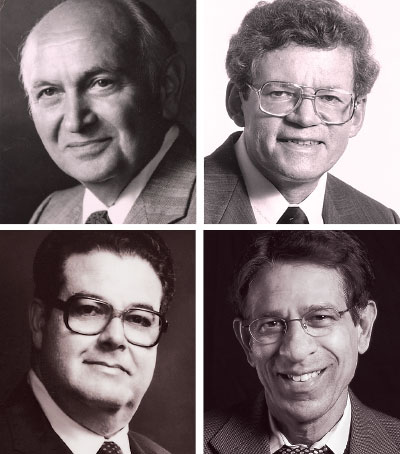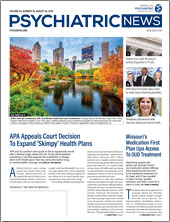For more than five decades, international medical graduates (IMGs) have made an indelible mark on psychiatric care in the United States, often providing treatment to the most vulnerable in underserved areas of the country.
At the same, time they have risen to leadership roles in academic medicine, community psychiatry, and organized medicine. Notably, current APA CEO and Medical Director Saul Levin, M.D., M.P.A., graduated from the University of Witwatersrand in South Africa before completing his residency at the University of California, Davis.
Four internationally renowned IMGs have served as president of APA: George Tarjan, M.D. (1983-84); Rodrigo Muñoz, M.D. (1998-1999); Pedro Ruiz, M.D. (2006-2007); and Dilip Jeste, M.D. (2012-2013). Albert Gaw, M.D., and Glenn Martin, M.D., are internationally trained physicians who have served as APA Assembly speaker. Meanwhile, Rajesh Tampi, M.B.B.S., M.S., is the president of the American Association of Geriatric Psychiatrists (AAGP), and Elizabeth Santos, M.D., M.P.H., is secretary/treasurer elect of AAGP.
IMGs have made their mark in American psychiatry while facing numerous challenges and obstacles—travel and migration costs and burdens, cultural and linguistic barriers, special educational hurdles, and discrimination.
“Unlike U.S. medical graduates, IMGs take longer to enter residency training in the United States after medical school graduation (despite obtaining higher scores on USMLE [United States Medical Licensing Examination] steps 1 and 2) due to the complex educational and immigration paths they traverse,” Nyapati Rao, M.D., a leader among IMGs within APA, wrote in a 2012 joint article in Psychiatric News with Jeste. “Therefore, a typical IMG who is starting residency in the United States is older than a typical [U.S. medical graduates] or [U.S. medical graduates training in other countries] and more often is simultaneously confronting different life-phase challenges such as raising children in a new culture.”
Today, IMGs may have heightened worries and fears about their immigration status. Following a 2017 White House executive order barring immigration from six countries, educational leaders who spoke with Psychiatric News said that the order had fostered unease among residents working in the United States, even those not from the countries directly affected by the order.
“Concern about entry to the United States for international medical graduates, apart from the status of the executive order, has created a lot of uncertainty for trainees and directors,” Consuelo Cagande, M.D., then chair of the IMG Caucus for the American Association of Directors of Psychiatric Residency Training, told Psychiatric News. “Trainees who are here in the country face a lot of anxiety about returning to their home countries … because they cannot be sure they will be able to return or not be delayed.”
According to the Association of American Medical Colleges (AAMC), in 2017 IMGs comprised 24.5% of all U.S. physicians (218,540 out of a total of 892,752 physicians). The number of IMG psychiatrists was 11,615, according to the AAMC.
“APA is in many ways a microcosm of global psychiatry,” wrote Jeste in the 2012 article in Psychiatric News, noting that following World War II there was an influx of psychiatrists from Europe that would change the face of American psychiatry. In more recent decades, Jeste observed, migration became more diverse and included most of the world’s countries.
The special needs of IMGs began to receive APA attention in the 1970s. Some important dates include the following:
•
At APA’s 1972 Annual Meeting in Dallas a special session was devoted to “foreign medical graduates” (FMGs). The symposium description called FMGs “another of APA’s neglected minorities, one now claiming a greater share of professional attention, resources, and understanding than it has currently been receiving.”
•
The APA FMG Committee was formed in 1979, to be renamed the Committee on IMGs in 1990.
•
In 1991 the APA Committee on IMGs launched a newsletter titled The International Psychiatrist; it continued its run until 2005.
•
In 1992, the George Tarjan Award was established to honor APA’s first IMG president and highlight the work of prominent IMG psychiatrists. Some winners of the award include, among others, Pedro Ruiz, M.D. (2002), past APA president; Norma Calderon-Panahon, M.D. (2004), an APA Assembly representative; Dilip Jeste, M.D. (2006), also a past APA president; Ramaswamy Viswanathan, M.D. (2017), minority and underrepresented trustee from 2017 to 2019; and Fructuoso Irigoyen-Rascon, M.D. (2018), former chair of APA’s IMG Committee.
•
In 1993, the Caucus on IMGs received a voting representative in the APA Assembly. Today the caucus is one of seven minority and underrepresented caucuses with a vote in the Assembly.
At this year’s APA Annual Meeting in San Francisco, five prominent IMG psychiatrists led the symposium “The IMG in U.S. Psychiatry: Adversity, Advocacy, Advancement” as part of the 175th Anniversary History Track.
The symposium was chaired by Calderon-Panahon, who is a representative to the APA Assembly from the Western New York Psychiatric Society and helped to establish the Tarjan Award Lecture when she was chair of the IMG Committee. She retired as medical director of the outpatient department at Buffalo Psychiatric Center in 2014. Calderon-Panahon is a past president of the Philippine Psychiatrists in America.
Other symposium presenters included Irigoyen-Rascon; Francis M. Sanchez, M.D., medical director of the Great River Medical Center and president-elect of the Iowa Psychiatric Society; Elizabeth J. Santos, M.D., M.P.H., clinical chief in the Division of Geriatric Mental Health and Memory Care at the University of Rochester School of Medicine and Dentistry; and Antony Fernandez, M.D., a professor of psychiatry at Virginia Commonwealth University.
All five described their journeys as IMGs, the obstacles they encountered and overcame, and their thoughts on the current and future place of IMGs in psychiatry and the broader field of medicine.
Despite the challenges that IMGs face, it is fair to say that American psychiatry today would look entirely differently were it not for their historical and ongoing contribution. At the Annual Meeting symposium, Sanchez cited the words of the late Young Kun Kim, Ph.D., a political science professor at Lehman College in New York, to highlight the strengths that all immigrants bring to the country and that IMG psychiatrists have especially brought to American psychiatry:
“[C]ross-cultural adaptation is a journey that compels us to make choices and to be accountable for the outcomes. Those who have successfully crossed cultural boundaries are likely to be those who choose to adapt and to be changed by that choice. Although their tribulations can be staggering, they have worked through the setbacks and come out victorious with an increased capacity to see others, themselves, and situations in a new light. Their personal achievements are a tribute to the ever-present human capacity to adapt—the capacity to face challenges, learn from them, and evolve into a greater self-integration.” ■


